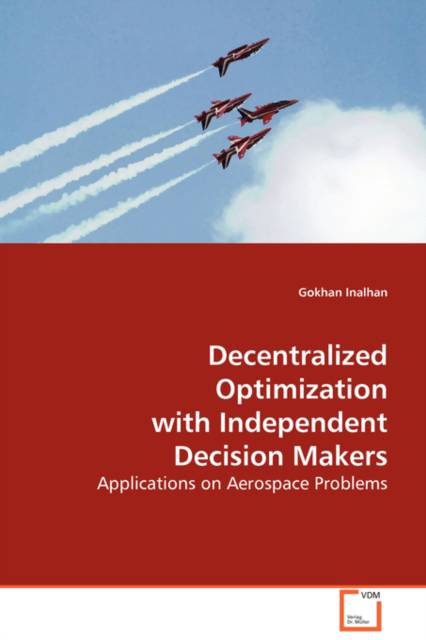
- Afhalen na 1 uur in een winkel met voorraad
- Gratis thuislevering in België vanaf € 30
- Ruim aanbod met 7 miljoen producten
- Afhalen na 1 uur in een winkel met voorraad
- Gratis thuislevering in België vanaf € 30
- Ruim aanbod met 7 miljoen producten
Zoeken
Decentralized Optimization with Independent Decision Makers
Applications on Aerospace Problems
Gokhan Inalhan
Paperback | Engels
€ 99,95
+ 199 punten
Omschrijving
Following the advances in electronics and
communications technology in the last three decades,
a new paradigm for large-scale dynamic systems
emerged. In this paradigm, groups of
independent dynamic systems, such as unmanned air
vehicles or spacecraft, act as a cooperative unit
for a diverse set of applications in remote sensing,
exploration, and imaging. These systems have been
envisioned to provide highly flexible and
reconfigurable structures that use individual
autonomy to respond to changing environments and
operations. The main aim of this work has been to
design methods and algorithms to enable efficient
operations for such large-scale dynamic systems when
a centralized decision-maker cannot or does
not exist. Towards this end, a decentralized
optimization method and a coordination algorithm
have been developed. This methodology is applied to
decentralized coordination problems from the
aerospace and the operations research fields.
communications technology in the last three decades,
a new paradigm for large-scale dynamic systems
emerged. In this paradigm, groups of
independent dynamic systems, such as unmanned air
vehicles or spacecraft, act as a cooperative unit
for a diverse set of applications in remote sensing,
exploration, and imaging. These systems have been
envisioned to provide highly flexible and
reconfigurable structures that use individual
autonomy to respond to changing environments and
operations. The main aim of this work has been to
design methods and algorithms to enable efficient
operations for such large-scale dynamic systems when
a centralized decision-maker cannot or does
not exist. Towards this end, a decentralized
optimization method and a coordination algorithm
have been developed. This methodology is applied to
decentralized coordination problems from the
aerospace and the operations research fields.
Specificaties
Betrokkenen
- Auteur(s):
- Uitgeverij:
Inhoud
- Aantal bladzijden:
- 184
- Taal:
- Engels
Eigenschappen
- Productcode (EAN):
- 9783639025798
- Verschijningsdatum:
- 6/11/2008
- Uitvoering:
- Paperback
- Formaat:
- Trade paperback (VS)
- Afmetingen:
- 152 mm x 229 mm
- Gewicht:
- 254 g

Alleen bij Standaard Boekhandel
+ 199 punten op je klantenkaart van Standaard Boekhandel
Beoordelingen
We publiceren alleen reviews die voldoen aan de voorwaarden voor reviews. Bekijk onze voorwaarden voor reviews.








